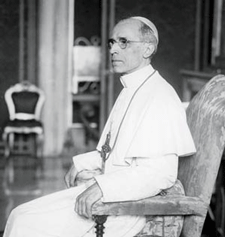The Vatican marked the 70th anniversary of the start of World War II with a series of messages highlighting Pope Pius XII’s warnings against hostilities in the weeks leading up to the war’s outbreak. In late August, Vatican radio replayed the pope’s address of Aug. 24, 1939, in which he told the world’s leaders that “the whole of humanity hopes for justice, bread and freedom, not the iron that kills and destroys.” L’Osservatore Romano, the Vatican’s official newspaper, printed the papal warnings against war, depicting Pope Pius as a prophetic figure who was ignored by those in power.
A week after the pope issued his appeal, German troops invaded Poland and ignited a six-year war that would leave an estimated 60 million dead, including six million Jews.
“Today, when the tension of spirits has reached a level that makes the unleashing of the tremendous whirlwind of war appear imminent, in a spirit of paternity we make a new and heartfelt appeal to governments and peoples,” the pope said in his 1939 address. “To governments so that, laying aside accusations, threats and the reasons for reciprocal mistrust, they try to resolve present differences through the only suitable means, that is, sincere joint agreements; and to peoples so that in calm and serenity, and without unbecoming agitation, they will encourage efforts for peace on the part of their leaders.”
Vatican Radio called the message “a milestone in the church’s service to peace.” On Aug. 24, L’Osservatore Romano argued that Pope Pius and his aides never stopped working for peace throughout the conflict. The article, signed by the newspaper’s editor, Giovanni Maria Vian, said the pope “helped the persecuted, without distinction,” inside the Vatican, in Rome, throughout Italy and in other European countries.
The role of Pope Pius during the war has been much debated in recent years. Against the accusations of indifference to the plight of Jews and inaction on other fronts, the Vatican has stepped up its defense of the wartime pontiff. In early August, the Vatican newspaper published a sharply worded critique of Allied governments for failing to help European Jews despite having detailed information about the Holocaust. The article contrasted U.S. and British inaction with the quiet efforts undertaken by Pope Pius to save as many Jews as possible.
Vatican media have presented the pope as a trained diplomat who followed the international events carefully, noting that in May 1939 he made a quiet but forceful push for negotiations. In a speech in June of that year, the pope expressed optimism for his diplomatic offensive, but those hopes slowly vanished as the months progressed. “We have tried and done what was in our power to stave off the danger of war,” the pope later said, predicting that the war would be unprecedented in its “physical and spiritual destruction.”
Amid the Vatican publicity, no mention has been made of Pope Pius XII’s pending sainthood cause. Despite a general recommendation in favor of Pius’s beatification, Pope Benedict put the cause on hold last year.








